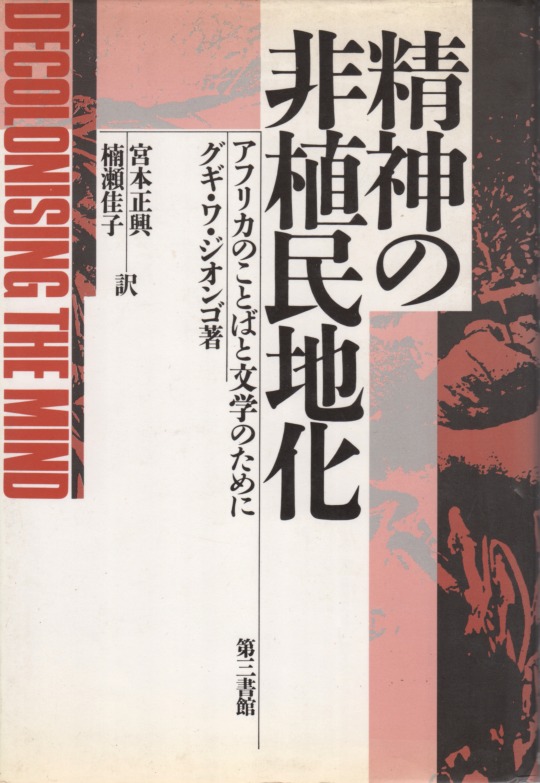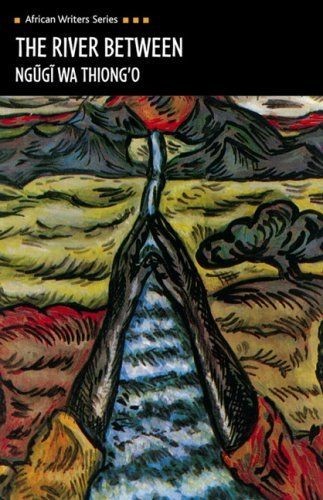#ngugi wa thiong'o
Text
In writing one should hear all the whisperings, all the shouting, all the crying, all the loving and all the hating of the many voices in the past, and those voices will never speak to a writer in a foreign language.
– Ngugi Wa Thiong'o
#fiction#fiction writing#writing tips#writing advice#ngugi wa thiong'o#quotes#kcawf original#writeblr
19 notes
·
View notes
Text

精神の非植民地化-アフリカのことばと文学のために
グギ・ワ・ジオンゴ
宮本正興・楠瀬佳子=訳
第三書館
#精神の非植民地化-アフリカのことばと文学のために#精神の非植民地化#DECOLONISING THE MIND#ngugi wa thiong'o#グギ・ワ・ジオンゴ#宮本正興#楠瀬佳子#anamon#古本屋あなもん#あなもん#book cover
48 notes
·
View notes
Text
His Defiance: Ngũgĩ wa Thiong’o and the Struggle for an Independent African Literature - Asymptote Blog









7 notes
·
View notes
Text


Kitabxanamın bir başqa incisi ♥
14 notes
·
View notes
Text
Ngũgĩ wa Thiong’o: three days with a giant of African literature | Ngugi wa Thiong'o | The Guardian
10 notes
·
View notes
Text
“If Achebe was the prime mover who captured the deep feeling of displacement that colonisation had wreaked, and Soyinka the witty, guileful intellectual who tried to make sense of the collision between African tradition and western ideas of freedom, then Ngũgĩ was the unabashed militant.”
Also from the article: “Of course I’d rather face the colonialist with the Bible than the one with a gun, but in the end, both the Bible-carrier and the gun-carrier are espousing the same thing.”
1 note
·
View note
Text
Despair is the one sin that cannot be forgiven.
Ngũgĩ wa Thiong'o
#quotes#life#quotations#quotation admiration#philosophy#quoteoftheday#Ngũgĩ wa Thiong'o#Kenya#literature#despair#sin#forgiveness#unforgiven#ngugi wa thiongo
3 notes
·
View notes
Note
14. Fav book you read this year?
this is so hard because i haven't really read anything that wasn't assigned all year (which for me is a really sad state of affairs), but of the books i did have to read for class, i'd say weep not, child by ngugi wa thiong'o was my favourite!
2 notes
·
View notes
Text
accomplishments
took care of more tax stuff
rested my hands
read and highlighted Ngugi wa Thiong'o's Decolonizing the Mind for my thesis
hung out with friends
reached out to an irl friend
ate two slices of my herby bread for breakfast with coffee
made basmati rice topped with cabbage and tahini butter for lunch
am now about a third of the way done with The Salt Grows Heavy
went to the grocery store to buy groceries!
discussion of my ED wrapped up with my intentions under the cut
intentions for tonight:
eat something. anything in my apartment that i'm not allergic to. any of the groceries i just bought. eat more than a third of a teaspoon of raspberry sorbetto. i ate very little today. two slices of bread, a half cup of cabbage, and some rice. that like. 600 calories. that's not enough. i think i might be backsliding or relapsing. i hope im not?? this is the last i'm gonna try to post about calories on here or mention them but. yeah im not doing well tonight. i think i had a really tough day full of anxiety and this culminated.
shower. i think showering will fix me.
brush my teeth
side note: sometimes i don't mind being Mad but sometimes Madness really fucks with me. this brought to you by my ED grabbing onto trauma from homelessness to prevent me from eating in order to "save money." so. that's fun. i'm having trouble showering now too. i'm gonna ask my roommate for help (he is partially my caregiver after all) but. yeah.
groceries just cost so fucking much tho it's unreal. like. anyway.
5 notes
·
View notes
Text
A couple of things I've read in the recent past and liked
Books
Girl In White Cotton by Avni Doshi
Still Born by Guadalupe Nettle
Simple Passion by Annie Ernoux
Books Currently Reading
The Lonely City by Olivia Laing (yes @ijaazat's reccs)
Decolonising the Mind by Ngugi Wa Thiong'o
On Photography by Susan Sontag
The Idea of Justice by Amartya Sen
The Truce by Primo Levi
Articles and Essays
The Myth of Objective Data by Melanie Feinberg
Guardian's amazing graph on the Boris Johnson scandal
On Capitalism and marriage and other such things by Daniel Tutt
#studyblr#100 days of productivity#things i read#tbr#articles#essays#reading recommendations#read in 2023#book recommendations
2 notes
·
View notes
Text

Man, I love this one. Ngugi originally wrote Matigari in his native Gikuyu while he was in political exile from Kenya in London. When it was published in Kenya 1986, people were talking about this fictional Matigari guy like he was a real person. The government wasn’t too happy about it, and they issued a warrant for Matigari’s arrest. They felt pretty stupid when they found out he wasn’t real, and in February 1987, the dictatorship raided every bookstore in Kenya to burn all copies. It is a great story of one man’s quest to restore justice to his homeland. Ngugi wa Thiong’o’s The River Between is a much more serious book dealing with Christian influence on two African tribes and the controversial issue of female circumcision. Petals of Blood is also one to put in your TBR pile.
-- Emily Gatlin
4 notes
·
View notes
Text
i rly rly want to just go to sleep now but that's gonna mean writing an entire (admittedly short) essay on ngugi wa thiong'o tomorrow during the day and i work better at night but also i have a headache and i wanna nap so i think i'm past the productive part of the night and into the exhausted and incoherent part so i suppose i will take my chances with daytime essay writing
#if i have to i'll turn off the wifi on my laptop and lock myself in my room without my phone so i can't be distracted#soapbox
5 notes
·
View notes
Text
“This, we have argued, is justifiable on various grounds, the most important one being that education is a means of knowledge about ourselves. Therefore, after we have examined ourselves, we radiate outwards and discover peoples and worlds around us. With Africa at the centre of things, not existing as an appendix or a satellite of other countries and literatures, things must be seen from the African perspective. The dominant object in that perspective is African literature, the major branch of African culture.”
- Ngugi wa Thiong'o, On the Abolition of the English Department
3 notes
·
View notes
Text
2024 (49)
the tunnel (ernesto sabato) - 8/10
between two worlds (miriam tlali) - 9/10
tales of hulan river (xiao hong) - 10/10
family ties (clarice lispector) - 10/10
butterfly burning (yvonne vera) - 9/10
i saw ramallah (mourid barghouti) - 10/10
fences (august wilson) - 10/10
almond blossoms and beyond (mahmoud darwish) - 8/10
«selected stories of xiao hong» (xiao hong, howard goldblatt ed.) - 10/10
the stream of life (clarice lispector) - 9/10
the perfect nine: the epic of gikuyu and mumbi (ngugi wa thiong'o) - 8/10
over all the mountain tops (thomas bernhard) - 7/10
why did you leave the horse alone? (mahmoud darwish) - 8/10
brocade river poems (xue tao) - 9/10
human mourning (jose revueltas) - 8/10
return of the spirit (tawfik al-hakim) - 9/10
the visit (friedrich durrenmatt) - 10/10
down and back: on alcohol, family, and a life in hockey (justin bourne) - 10/10
juha (juhani aho) - 10/10
only in the meantime & office poems (mario benedetti) - 9/10
springtime in a broken mirror (mario benedetti) - 10/10
the sonnets (stephane mallarme) - 7/10
bestiary: or the parade of orpheus (guillaume apollinaire) - 8/10
maze of justice: diary of a country prosecutor (tawfik al-hakim) - 9/10
tales and stories for black folks (toni cade bambara et al) - 10/10
the black woman (toni cade bambara et al) - 10/10
fictions (jorge luis borges) - 10/10
a raisin in the sun (lorraine hansberry) - 9/10
memory for forgetfullness (mahmoud darwish) - 10/10
black friend: essays (ziwe) - 10/10
are prisons obsolete? (angela y. davis) - 10/10
waiting for godot (samuel beckett) - 10/10
the garden party (vaclav havel) - 9/10
dust tracks on a road (zora neale hurston) - 9/10
wild thorns (sahar khalifeh) - 10/10
everything good will come (sefi atta) - 10/10
men in the sun and other palestinian stories (ghassan kanafani) - 10/10
minutes of glory and other stories (ngugi wa thiong'o) - 10/10
midaq alley (naguib mahfouz) - 9/10
a man of letters (taha hussein) - 7/10
the beggar's opera (vaclav havel) - 8/10
soul gone home (langston hughes) - 8/10
mulatto (langston hughes) - 10/10
the weary blues (langston hughes) - 9/10
the quarter (naguib mahfouz) - 10/10
pedagogy of the oppressed (paulo freire) - 10/10
after midnight (irmgard keun) - 9/10
a gentleman in moscow (amor towles) - 7/10
peace and its discontents (edward said) - 10/10
0 notes
Text

Alredered Remembers Kenyan novelist, dramatist, and critic Ngugi wa Thiong'o, on his birthday.
"Christianity and Western civilization-what countless crimes have been committed in thy name!"
Ngugi wa Thiong'o
0 notes
Photo

Ngũgĩ wa Thiong'o (originally James Thiong'o Ngugi, born January 5, 1938) is a Kenyan writer and academic who writes primarily in Gikuyu. His work includes novels, plays, short stories, and essays, ranging from literary and social criticism to children's literature. He is the founder and editor of the Gikuyu-language journal Mũtĩiri. His short story The Upright Revolution: Or Why Humans Walk Upright, has been translated into 90 languages from around the world. He embarked upon a novel form of theatre in his native Kenya that sought to liberate the theatrical process from what he held to be "the general bourgeois education system", by encouraging spontaneity and audience participation in the performances. His project sought to "demystify" the theatrical process, and to avoid the "process of alienation produces a gallery of active stars and an undifferentiated mass of grateful admirers" which, according to him, encourages passivity in "ordinary people". Although his landmark play, Ngaahika Ndeenda, co-written with Ngugi wa Mirii, was a commercial success, it was shut down by the authoritarian Kenyan regime six weeks after its opening. He was imprisoned for over a year. Adopted as an Amnesty International prisoner of conscience, the artist was released from prison and fled Kenya. In the US, he taught at Yale University for some years, and has since taught at NYU, with a dual professorship in Comparative Literature and Performance Studies, and at UC Irvine. He has been regarded as a candidate for the Nobel Prize in Literature. Four of his children are published authors: Tee Ngũgĩ, Mũkoma wa Ngũgĩ, Nducu wa Ngũgĩ, and Wanjiku wa Ngũgĩ. #africanhistory365 #africanexcellence https://www.instagram.com/p/CnCJbT9r6Tb/?igshid=NGJjMDIxMWI=
1 note
·
View note